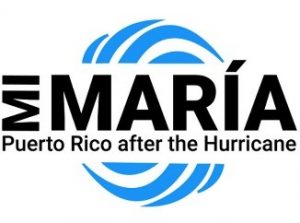
Por: Ricia Anne Chansky, Ph.D.University of Puerto Rico at Mayagüez
Research Affiliate, York University CERLAC
Fulbright Specialist in US Studies – Literature

Over 150 students at the University of Puerto Rico at Mayagüez are participating in a large-scale public humanities project, “Mi María: Puerto Rico after the Hurricane,” led by Dr. Ricia Anne Chansky, professor in the Department of English. This project is conducted within the theoretical contexts of critical disaster studies, environmental humanities, and auto/biography studies.
In the autumn 2018 semester, approximately 100 students enrolled in courses with Chansky and collaborator, Dr. Jocelyn Géliga Vargas, in which they were trained in the ethical collection, transcription, translation, and editing of oral histories. These students collected personal narratives of Hurricane María and its aftermaths in their home communities, working to gather and circulate these stories of the people of Puerto Rico. The courses affiliated with the project won an Innovation in the Humanities Award from the Modern Language Association.
In the spring 2019 semester, fifty additional students joined this research collective and the project widened its methodological approach to include the collection and study of multimodal biographical narratives, including radio broadcasts, song lyrics, digital micronarratives, and photographs, among others.
This project is being conducted in collaboration with Voice of Witness—an organization dedicated to amplifying unheard voices—and the Humanities Action Lab “Initiative on Climate and Environmental Justice,” collaboratively led by Columbia University, Rutgers University, and The New School.
At the end of the project, an edited volume of oral histories of the hurricane and its aftermaths will be published in the Voice of Witness book series produced by Haymarket Books, which will be accompanied by a curriculum that meets Common Core standards. Books in this series are used in over 20,000 classrooms, are distributed to legislators, and have been cited as evidence in legal cases. The book is coedited by Chansky, Géliga Vargas, Marci Denesiuk, and Yarelmi A. Iglesias Vazquez. The book is funded in part by a grant from the National Endowment for the Arts and an award from the Canada Council for the Arts.
UPRM students will also make a contribution to the Humanities Action Lab international traveling exhibition, which will be based upon the collected oral histories and other narratives of the hurricane, such as: parranda lyrics, comics, radio broadcasts, and artwork. The exhibition, Climates of Inequality, will open at Rutgers in October 2019 and will travel to UPRM in 2021. Chansky and two students involved in the project, Kiara M. Rivera Santiago and Bryan Ramos Romero, will attend the exhibit opening in Newark, NJ as guests of the Humanities Action Lab.
There will be a permanent digital version of this exhibition hosted by Rutgers and a breakout portion of the exhibition that will travel independently throughout Puerto Rico and the United States.
The breakout exhibition is based upon initial analyses of the over 150 collected oral histories of Hurricane María and follows the theme community response to climate disaster. Within that framework, Chansky has identified four main areas related to disaster that emerge across the narratives: clean water, food security, homelessness, and medical and mental health. In response to these patterns noted in the oral histories, students formed research collectives that studied successful community-based responses to these issues, conducted further interviews in relation to the narratives, and are in the early stages of compiling bilingual manuals for future community-based responses for Puerto Rico and other places threatened by climate change. Several researchers from around the world have already contacted the project lead to ask for insights garnered from the study of these narratives.
One example of a tangible outcome from this part of the project is a response to the concerns regarding the mental health of children that were discussed in the oral histories. Students in the project conducted follow up interviews with social workers, teachers, Head Start leaders, a children’s librarian, and a professor of children’s literatures to complete their specialized research into this issue. Working closely with Professor Chansky, they then cocurated an exhibition of children’s books about climate and environmental issues; wrote an accompanying informational brochure for teachers, librarians, and parents; coauthored an essay that was published in Anansesem: The Caribbean Children’s Literature Ezine; and, cowrote a children’s book, Maxy Survives the Hurricane/Maxy sobrevive al huracán, which was accepted for publication by Arte Público Press’s children’s imprint, Piñata Books.
Students from our project have been interviewed by Radio Isla and Radio Isla del Oeste, and the project was written up in El Nuevo Dia, Primera Hora, Noticias Xtra, Hoy Los Angeles, and El Enconomista America. Primera Hora also ran a frontpage story about the project in honor of the two-year anniversary of María.
One of our narrators, Zaira Arvelo Alicea (a UPRM MAEE alum), was also recently flown to San Francisco to speak in front of the over 200 attendees at a Voice of Witness event, “Brave Stories, Bold Movements,” where she presented on a program that included Isabel Allende. Voice of Witness has also produced a podcast interview with several student participants.
The project is partnered with Fundación de Culebra, Fundación Surfrider Rincón, Sandra Farms, Mayagüez Biblioteca Juvenil, and has collaborations with the National Museum of Puerto Rican Arts and Culture, Museo de Arte Contemporáneo de Puerto Rico, La Fundación Casa Cortes, Universidad Interamericana de Fajardo, UPR Aguadilla, UPR Cayey, Columbia University, Columbia University Library, University of Connecticut at Storrs, and Florida International University, among others.
For more information, please visit our website: www.mimariapr.org.

![Mi María Project [English Version] Slide](http://www.uprm.edu/arci/wp-content/plugins/revslider/sr6/assets/assets/dummy.png)